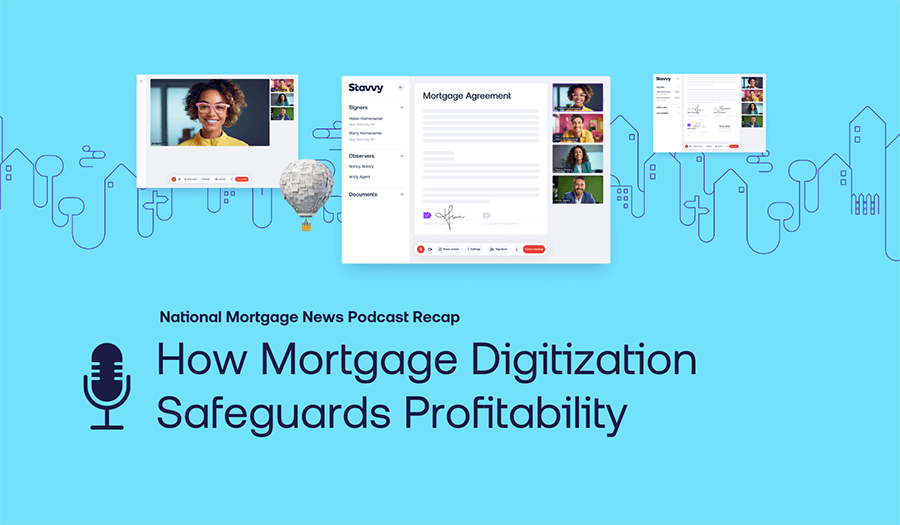The title industry is buzzing with talk of technology, and more specifically, remote online notarization (RON) and eClosing platforms.
An eClosing platform can increase productivity and operational efficiency while improving the customer experience. But is now the right time for title companies to invest in a digital title closing solution?
Todd Ewing, CEO of Federal Title and Escrow Company and Kosta Ligris, CEO of Stavvy discussed the answer to this question and more.
Collectively, they share their real-life real estate closing experiences and how eClosing positively impacts title company operations and customers. Below is a breakdown of key takeaways:
- Consumers are looking for digital options, making now the ideal time to invest in eClosing technology.
- Digital closing mitigates common security, privacy, and chain of custody risks often associated with traditional and mail-away real estate transactions.
- Title agents have more control over a digital transaction than an in-office closing.
- Title companies that invest in an eClosing platform can expect to experience cost savings and other operational efficiencies.
Consumers want digital real estate closings
Good business is centered around customers. What do they want? What do they need?
In the title industry, offering customers a traditional, in-office closing experience was routine for years. But that was before RON. Today, remote notarization and the desire for digital experiences are shaking the status quo and encouraging title companies to explore something new.
“Eighty-five to ninety percent (85-90%) of consumers are electing for digital and online [closing] when offered the opportunity. And so that in and of itself will tell you what drives the impetus for this. At Stavvy, we do what our customers want. Financial institutions and title and settlement companies drive that need and demand [for eClosing]. And I think the same will apply to originators. They will go to what their consumers and customers are asking for, and as loan officers are being asked for those options, it’s important to be able to provide them,” shares Ligris.
Digital title solutions provide title companies with more control over real estate closings
Traditional real estate closings leave something to be desired for customers and title companies. A digital real estate closing approach eliminates shipping documents and the risks often associated—documents lost in the mail, sent back incorrectly, or unnotarized—and puts title agents back in the driver’s seat of their closings.
“We have control. We know the right person is signing the documents, they’re being notarized by the right person, and they’re in our possession. We never lose possession of those documents. I can tell you stories about packages being lost or not coming back; when they do come back, they are completely wrong. Our staff feels more in control and more confident conducting closings [with an eClosing platform],” shares Ewing.
Digital closing with a quality eClosing platform mitigates security, privacy, and chain of custody risks for title companies with real estate closing-specific features, such as credential analysis, knowledge-based authentication (KBA), digital audit trails, and recorded remote notarization sessions.
“The reality is that the credential analysis we conduct using technology is far superior to what happens in person. The recorded RON session, the audit trail, the ability to control the chain of custody around the documents, knowing where they are at any given time,” shares Ligris.
Title companies that implement digital real estate closing can experience cost savings and operational efficiency
Greater closing control brings greater operational efficiency, productivity, and customer experiences. Ewing shares how the Federal Title and Escrow Company team performs eClosing seamlessly and swiftly in the Stavvy platform.
“Our settlement attorneys have a lot more control now with scheduling the closing. They get the document they need uploaded into the platform and are ready to go. As a result, we save a lot of money. We don’t have to worry about getting our scheduler involved, going back and forth with the parties as to what time, where, and how to give directions, or if they’re lost or can’t figure out where to park. Whatever the case may be. Overall, it’s cost savings and efficiency,” says Ewing.
Learn more about how the  is taking real estate beyond documents.
is taking real estate beyond documents.



![[Webinar Recap] Advancing Your Digital Default Servicing Strategy](https://blog.stavvy.com/hubfs/advancing-your-digital-default-servicing-strategy-blog-recap.png)